Stephen Theaker's Blog, page 12
May 27, 2024
Stray Pilot, by Douglas Thompson (Elsewhen Press) | review by Stephen Theaker
 After World War II, American pilot Thomas Tellman decided to stay in Scotland. He joined RAF Squadron 576, married a Scottish woman, and had a daughter and son with her. They lived in a prefabricated house just outside of Kinburgh, a little place that was hardly much more than a village, up until 1948, when he pursued a UFO high above the clouds and never came back. His seven-year-old daughter, Mary, grew up, had children of her own, and grew old and infirm. His wife died, his son died.
After World War II, American pilot Thomas Tellman decided to stay in Scotland. He joined RAF Squadron 576, married a Scottish woman, and had a daughter and son with her. They lived in a prefabricated house just outside of Kinburgh, a little place that was hardly much more than a village, up until 1948, when he pursued a UFO high above the clouds and never came back. His seven-year-old daughter, Mary, grew up, had children of her own, and grew old and infirm. His wife died, his son died.And then, eighty years after he disappeared, he returns, only a year older than when he left. His 87-year-old daughter has dementia. Kinburgh is now a town. Pollution has changed the air, sea and land. All the other prefab houses have long since been demolished, but his daughter still lives in theirs, and when he returns she is delighted. She barely remembers the last half-century anyway, so she’s not asking why he’s so young, she’s wondering why she’s so old.
He reports for duty at RAF Kinburgh Air Base, but they don’t take him seriously, at least at first. So he takes a part-time job as a gardener. He starts a romance with one of his daughter’s carers. His mother’s health shows signs of improvement. Everything seems rather nice and jolly, but Thomas knows it won’t last. He has an important message for the world, and he doesn’t expect anyone to be happy to hear it.I’m obviously quite biased towards Douglas Thompson’s fiction, given that he has let us publish eight of his stories, but of course the reason I wanted to publish his stories is because I like his fiction. Still, not all readers of this review will know that history, so it’s worth mentioning it before I go on to say how much I loved this book – even though it’s nothing like the experimental work I’ve read by him before.
This is more in the vein of a John Wyndham novel, understated and plain-spoken, albeit with global consequences. Its gentle humanism and tenderly-drawn relationships made me think of it as the Jimmy Stewart science fiction film we never got – or Sidney Poitier, rather, since the protagonist is black (which explains his reluctance to return to Kentucky in the 1940s). His anger over environmental issues felt anachronistic at first, but we soon learn how much he learnt on the subject in what was, for him, a year away from Earth.
The dialogue and characterisation is realistic, rather than arch or oblique – people ask all the questions you would expect them to – and any reader with a heart will be touched by Mary’s childish happiness at having her beloved, long-lost dad back in her life and looking after her. I had lots of sympathy for Mary’s carer Chrissy too, trying mostly in vain to alert the authorities to the safeguarding issues raised by a potential imposter installing himself in the house of an elderly woman with dementia.
If the book has a flaw, it’s the decision to put all dialogue in italics rather than quote marks, which has the impact you’d expect on the book’s readability, especially when long conversations or speeches add up to a screen full of italics, and for no obvious benefit. It also makes it slightly harder than usual to tell whether someone is speaking or thinking. Some readers might also feel at first that there’s not enough flying for a book with a plane on the cover and the word “pilot” in the title, but it plays a significant and satisfying part in the conclusion.
I thought Stray Pilot was a smashing novel, full of character and mystery, and carefully focused on what counts. On the downside, now I feel guilty that I won't be there to hug my children when they are elderly… Stephen Theaker ****
May 24, 2024
The Arrest by Jonathan Lethem (Ecco) | review by Stephen Theaker
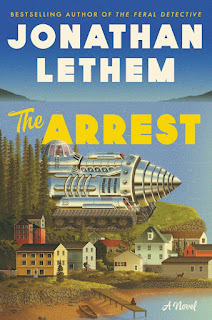 This review originally appeared in Interzone #289 (November–December 2020).
This review originally appeared in Interzone #289 (November–December 2020).Journeyman used to be a screenwriter, though none of his films ever got made. His name back then was Alexander Duplessis. He spent a long time working with producer Peter Todbaum, a Harvey Weinstein-like friend from college, on a pet science fiction project, Yet Another World. Now he lives in Tinderwick, a small town on an isolated peninsula in what used to be New England, wiping up the blood left by the butcher and delivering the meat.
The reason he finds himself there is the Arrest, when things just stopped. The internet, guns and cars stopped working, planes fell from the sky, Miami drowned. A tick-borne virus closed up the throats of anyone who ate beef. Journeyman is stuck where he had been on holiday, visiting his sister Madeleine, and knows next to nothing about what is happening elsewhere.As apocalypses go, it's among the cosiest, at least for the people in Tinderwick and the other small towns on its peninsula. It’s like a post-apocalyptic Gilmore Girls, a town full of kooky, self-reliant, community-spirited artisans. But access to and from the peninsula is controlled by the Cordon, flinty types on horseback who trade their protection for luxuries like chutney, mackerel and marijuana. No one who leaves has ever returned.
The novel is divided into five parts: a day (Tuesday), a month (October), a season (winter) and two eras (Yet Another Arrest and Aftermath). It is on Tuesday that Todbaum arrives, driving an armoured, nuclear-powered supercar, having apparently steamrolled and battered his way across the country. He'll speak only to Journeyman or Madeleine, and she wants nothing to do with him.
I've seen some very negative reactions to this book, even from people who have previously enjoyed Jonathan Lethem's work. (He is also the author of Motherless Brooklyn, which Ed Norton recently adapted for film, and The Feral Detective, which is in development.) Perhaps those readers who haven't read his previous work, who have fewer expectations and for whom his style will be novel, will enjoy it more. I certainly did.
The plot does get off to quite a slow start, as some have complained, but the very short chapters stop it from dragging. And while it is slightly frustrating for readers to learn so little about life outside the town, this isn't accidental, it plays an important role in the story: what we do hear is from Todbaum, who talks like the Hollywood movie producer he was, his clichéd, inconsistent stories nabbed from old science fiction films.
For much of the book, it feels like a prime example of least-interesting-character syndrome, in that Journeyman rarely knows what is going on, doesn't explore his world, and ambles through events without making any significant decisions. He's never in the room where it happens. But as the book goes on it becomes clear that this too is no accident. His capable, inventive sister didn’t need his help.
I read it as a #metoo story. The nuclear-powered supercar seems straightforwardly phallic, forcing its way across the country and into their town. Once there, it drills into the water table and begins to pollute it with effluent, while the radiation from its engine kills the grass and Todbaum's tall tales attract followers who don't care what he's done.
Madeleine, having had an unpleasant sexual experience with Todbaum thirty years before the Arrest, knows he can't be allowed to permanently poison the town, and prevents this not through a macho act of individual heroism, but by bringing the community together to neutralise, very cleverly, the danger that he poses. This leads to an ending that is extremely satisfying, both in a moral sense, and also in the pleasure of seeing Madeleine and the author's plots unfurl.
Another thing I liked was Journeyman's notion of "time averaging", which comes up frequently. The idea is that when you see someone again, after years have passed, it takes time for you to see them as they really are now, rather than trying to overlay how they looked before. This reflects the book's exploration of how long it can sometimes take to realise that the people who used to control you have lost that power.
I thought it was very good, to the extent that I'm rather baffled as to how, until now, I managed to completely miss the books of Jonathan Lethem, a literary author who loves Philip K. Dick, co-wrote six of the songs on one of my favourite albums and has frequently appeared in McSweeney's, my second favourite fiction magazine. To read a book and discover in it a new favourite author is always a wonderful feeling. Stephen Theaker ****
May 22, 2024
The Night Parade by Ronald Malfi (Kensington) | review by Douglas J. Ogurek
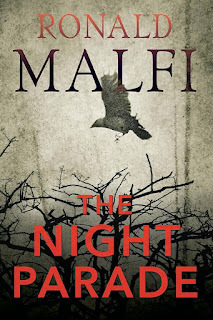 Plague story infected by lack of action and conflict.
Plague story infected by lack of action and conflict.The Night Parade, yet another outbreak story, introduces Wanderer’s Folly, a disease that enrages people, makes them lose their minds and eventually kills them. Moreover, the birds have disappeared, and insects are getting larger.
English professor David Arlen and his eight-year-old daughter Ellie, holding a shoebox with unhatched bird eggs, hit the road after wife/mother Kathy dies in hospital. David is convinced that Kathy was immune to the disease and that the medical establishment tested her to death. Now, those same individuals want to get their hands on Ellie, who has a blossoming special power.
David, who may or may not be infected with Wanderer’s Folly, disguises Ellie as a boy, and they drive around aimlessly until David decides he wants to go to a relative’s house. Like many fictional children, Ellie displays unrealistic intelligence and wisdom beyond her years.
Although there are tense passages and the ending ratchets up the action, the novel suffers from stagnation and meaningless scenes and dialogue. The main characters wander around and converse about uninspiring topics. Their psychological underpinnings are weak, and most goals are short-lived. The Night Parade also includes superfluous backstory about the early days of Wanderer’s Folly and Kathy’s death. Moreover, the novel gets bogged down in details that do not support the plot. We do not need, for instance, a step-by-step explanation of David dyeing his hair black.
When the characters finally get to a potential conflict, Malfi effectively keeps the reader guessing whether strangers’ hospitality is genuine or feigned for some nefarious purpose. Additionally, some characters’ physical characteristics – droopy eyes or lanky bodies, for instance – add to the realism of scenes. Another creepy detail: when face masks run short, some people resort to cheap plastic Halloween masks, while others wear paper plates with eye holes cut out.
The Night Parade is just as much about a father’s willingness to accept his daughter’s point of view as it is about a rampant disease. Unfortunately, the novel’s wavering nature detracts from the story. Douglas J. Ogurek **
May 20, 2024
IF | review by Stephen Theaker
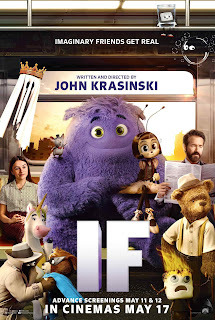 After being so excellent in later seasons of The Walking Dead as Judith, the equally capable daughter of Rick Grimes, Cailey Fleming now takes the lead in possibly the worst-titled film of the year, IF – short for Imaginary Friend, and a nod to the infinite possibilities of the imagination. Fleming plays Bea, a twelve-year-old girl who, after losing her mother to illness, could now lose her father too (John Krasinski). While he’s on a long stay in hospital, being prepped for what he assures her will be a routine heart operation, she stays in a cosy apartment with her lovely but (if you ask me!) nigh-on criminally negligent grandma (Fiona Shaw).
After being so excellent in later seasons of The Walking Dead as Judith, the equally capable daughter of Rick Grimes, Cailey Fleming now takes the lead in possibly the worst-titled film of the year, IF – short for Imaginary Friend, and a nod to the infinite possibilities of the imagination. Fleming plays Bea, a twelve-year-old girl who, after losing her mother to illness, could now lose her father too (John Krasinski). While he’s on a long stay in hospital, being prepped for what he assures her will be a routine heart operation, she stays in a cosy apartment with her lovely but (if you ask me!) nigh-on criminally negligent grandma (Fiona Shaw).Bea’s dad encourages her to make the most of her time in New York, to make an adventure of it. As a realist, she bristles at his incessant attempts to keep her spirits up, just as she bristles at grandma’s attempts to treat her like a little kid, but she still follows his advice. The optics of it aren’t great: she sees an adult man (Ryan Reynolds, highly effective in a more downbeat role than usual) breaking into a child’s first-floor bedroom, and rather than calling the police she starts going on long walks with him around the city. Fortunately for her, and the film, Cal isn’t a predator, he’s sort of a social worker for childless imaginary friends. She becomes his assistant.
That writer-director Krasinski followed up A Quiet Place and its sequel with this children’s film might baffle anyone who has seen its trailer, which makes it look like a goofball close cousin to Adam Sandler’s Bedtime Stories, and doesn’t really convey the film’s tone – or quality – well at all. To anyone who has watched the film, the throughline is obvious. Like Krasinski’s previous films, IF is deeply emotional, and humanistic, rooted in character, a story of people looking for a way to carry on living after the worst has happened. The family in A Quiet Place are lonely, starved of human connection, and that’s what IF is all about. What happens to imaginary friends when they lose their kids? What happens to a family without mum? What happens to the elderly, the unloved, the lost?
In the real world an imaginary friend might not help much with loneliness – unless of course lots of other people have the same imaginary friend and you meet regularly in draughty buildings to talk about him. But there’s nothing wrong with a film pointing to a real problem and offering a fantastical solution. It still gets us thinking about the problem. I realise that I’m making it sound po-faced and sad, but when this film got me to shed a tear (and it did, I admit) it was out of sheer happiness. It’s literally heart-warming, as Bea and Cal work out how to re-ignite the hearts of IFs and the adults who have forgotten them.
The performances are uniformly excellent. Fleming portrays a character with the same intensity, determination and intelligence as Judith in The Walking Dead, but she gets to have a bit of fun here too, and she’s more convincing in her interactions with computer-generated characters than many adult actors ever manage. It’s fun trying to recognise the voice actors (Phoebe Waller-Bridge and Sam Rockwell are particularly good), and those CGI characters are some of the best-realised I’ve ever seen, integrated so perfectly with the live action that we never doubt their existence. I would love to see Krasinski and his effects team apply these skills to spaceships and aliens.
It’s very funny too, but is it as good as Drop Dead Fred? That’s an unfair question, because that’s one of my favourite films of all time. But IF is definitely better than Imaginary, the year’s previous film about children grieving their mother with the help of an imaginary friend. Imaginary wasn't terrible, but it was deeply derivative of Insidious and its sequels, whereas IF is its own film. You could perform the whole thing with actors on a stage and it would be just as moving. It was a shame to be watching it in a near-empty cinema, though not a surprise – I only watched it because my wife thought it would be good, and as usual she was right. I think it will find fans as soon as it hits a streaming service. And I bet they’ll watch it more than once to spot all the subtle clues they missed the first time around. Stephen Theaker ****
May 17, 2024
How to Mars by David Ebenbach (Tachyon Publications) | review by Stephen Theaker
 This review previously appeared in Interzone #290-291 (March-June 2021).
This review previously appeared in Interzone #290-291 (March-June 2021).Two years ago, a small colony was established on Mars, funded by a reality show, Destination Mars! Unfortunately, the show was cancelled once life on Mars turned out to be extremely boring. Even the Martian water was dull, with not a microbe nor a minibeast in sight. Fortunately, the production company continued to send supply rockets, so life goes on.
The six colonists, three men, three women, were selected for their tolerance for boredom and their desire to escape Earth. It was always meant to be a one-way trip. But now things are changing because Jenny is pregnant. Everyone's tubes were supposed to be tied before lift-off, and they weren't even supposed to be having sex: the rule book was very clear about that.While five colonists concern themselves with whether a Martian pregnancy can produce a healthy child, another problem is brewing. Stefan, the Danish engineer, once broke the fingers of Roger the botanist and geologist, just because he wanted to and because he could. He's been following the rules since then, but he is in a bad place and increasingly sick of everyone.
Although the suggested book group questions describe this as a "novel-in-stories", and discrete chunks of it previously appeared as short stories in Analog and Asimov's, readers probably won't notice the difference, since the story of the colonists is told in more or less chronological order, albeit with extracts from the unofficial Destination Mars! handbook interleaved.
Those non-narrative sections are jokier than the rest, and although there is some wisdom there, the more the book goes on, the more they feel a bit repetitive and intrusive, a distraction from the story, and perhaps even indicative of a lack of confidence in the narrative's ability to hold the reader's interest on its own, without gimmicks. Which is a shame, because the story is a good one.
Like Big Brother at its peak, the book gets us caring about its isolated characters with remarkable efficiency. It's easy to empathise with their precarious situation, and the psychological effects upon them of the child's imminent arrival are realistic and well-drawn. The book isn't as profound, perhaps, as it is aiming to be, nor as funny, but its drama is compelling. Stephen Theaker ***
May 10, 2024
Machine by Elizabeth Bear (Saga Press) | review by Stephen Theaker
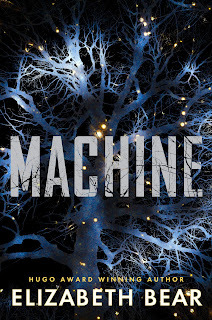 This review originally appeared in Interzone #289 (November–December 2020).
This review originally appeared in Interzone #289 (November–December 2020).Dr Brookllyn Jens (Llyn for short) is the rescue co-ordination specialist on the Core General-affiliated medical vessel I Race to Seek the Living. The current mission: Big Rock Candy Mountain, a very old generation ship, has been found hurtling through space at high speed in the wrong location and the wrong direction. Its crew was placed in rickety frozen hibernation by an insane captain and a buxom AI named Helen Alloy (a pun, apparently, on Helen of Troy). Helen has spent the subsequent lonely years upcycling the ship into new components for an intelligent machine, one that looks as if it is made of Tinkertoys (a colourful, wooden, American equivalent of Meccano). But that might not be the machine of the title: the police-issue exosuit that makes it possible for pain-ridden Llyn to live life as she does is just as important to the plot.
Machine takes place in the same universe as the author’s 2018 novel Ancestral Night, a universe where the White Space that gives this series its name is used to dodge Einstein’s inconvenient speed limits. For the most part this book follows different characters, and readers jumping in at this point are unlikely to feel at a disadvantage, especially if they have read any of James White’s Sector General stories, which are a heavy influence. Like Dr Conway in that series, Llyn loads up her brain with the personalities of alien doctors and has to deal with their unfamiliar feelings. Her colleague Rilriltok is, like Dr Prilicla, a large empathetic insect. When a gruff human authority figure called O’Mara was introduced I wondered whether this was actually an official continuation; in a post-novel note the author describes it as a homage. (She also cites C.J. Cherryh as a big influence on the book.)
That similarity wasn’t a problem for me: I love the Sector General books. If anything it raised my expectations a little too high. For one thing, the Sector General stories were quite short, even the novels, and this story is about 147,000 words long. The first third is exciting and raises many mysteries. Why is the ship there? Why were the people frozen? What’s the Tinkertoy machine and who or what is this embarrassingly busty robot? But it slows down somewhat in the second third, when the crew takes those mysteries back home to Core General and has a good think about them. This is also the point at which I almost went off Llyn. Once she starts talking to Helen and learns about the social attitudes of the frozen people, she becomes a bit smug about how dated their views are. She tells us often how humanity has now been Rightminded, which involves mental reprogramming and copious amounts of drugs.
It wasn’t clear to me whether the extreme regulation of human thought presented in the book is intended to be satirical or utopian – when a man from the past is awoken it feels rather like Captain Kirk among the Vulcans. And would Llyn have been so willing to spend so much time away from her family if she weren’t able to damp down all of those supposedly atavistic negative feelings? Her thought processes, as shown in her first-person narration, seem pretty similar to ours, and being Rightminded sometimes amounts to little more than using more sensitive language. She is extremely critical of the oversexualised design of Helen Alloy, and how badly that reflects upon the engineers who made her, but spends a lot of time dwelling on her looks. One might say the book has its cheesecake and eats it, given how frequently Llyn comments on the AI’s curves and the way they squish up against things.
As events progress, it becomes clear that, although Core General is a medical setting, this is not really the type of science fiction medical mystery some readers might have hoped for. That’s not to say it isn’t entertaining: once things start going seriously wrong at Core General the plot is fairly non-stop until the end. I would have loved this book if, like the same author’s New Amsterdam, there had been five different stories within its pages, instead of just the one, but although it felt drawn-out, it was still pretty good. It all ties up, even if some parts of the overall mystery, once revealed, seem to result from the antagonists having gone about things in the most bafflingly over-complicated way. Whatever readers end up thinking of the answers to the mysteries, the journey to uncover them is replete with thrills, spills and indeed chills, and you can’t help admiring Llyn’s grit and competence. Stephen Theaker ***
May 7, 2024
Cemetery Boys by Aiden Thomas (Swoon Reads) | review by Douglas J. Ogurek
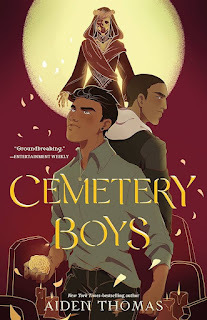 Young adult novel muddies message of acceptance with lackluster writing.
Young adult novel muddies message of acceptance with lackluster writing.Sixteen-year-old Yadriel, a trans gay boy (born female, identifies as male, attracted to males) and member of a Latinx family, wants more than anything for his East Los Angeles brujx (a gender-nonconforming variant of the Spanish bruja/o, meaning “witch” or “sorcerer”) community to accept him as a brujo (a male who finds lost spirits and sends them to the afterlife). He plans to do this by summoning the ghost of his murdered cousin Miguel, then guiding him to the afterworld. Alas, Yadriel’s father holds firm to tradition, which prohibits people born female from becoming brujos — they must develop into brujas. The only two who seem to wholeheartedly embrace Yadriel’s identity are his cousin and friend Maritza and his uncle.
Thus, Cemetery Boys is a young adult novel about transitioning, from the spirit world to the afterlife, from female to male, and from one mindset to another.
The trouble begins when Yadriel, accompanied by Maritza, inadvertently summons the ghost of high school classmate and reputed gang member Julian Diaz. Yadriel wants to use his special knife to cut the magical thread that binds Julian’s spirit to Earth and therefore send him to the afterlife. But Julian begs for Yadriel to hold off so he can make sure his friends are okay. Yadriel relents, flaunts the brujx rules, and takes the “reckless and beautiful” Julian through various obstacles while attempting to avoid detection by most people (who can’t see Julian) and Yadriel’s magical kin (who can).
Yadriel and Julian get to know each other and their shared inner struggles. Clearly, Yadriel is attracted to Julian, who, despite his immaturity, unconditionally accepts Yadriel as a boy. But it seems the feelings aren’t necessarily mutual. Author Aiden Thomas adds tension by setting a deadline: if Yadriel doesn’t send Julian over by Día de Muertos (the Day of the Dead) in just a few days, Julian’s spirit might turn maligno.
The message that this book attempts to convey is a good one. The story, however, falters. It suffers from several repeating elements that become grating. Examples include physical gestures (lip biting, arm crossing, hand raising) intended solely to punctuate dialogue, an obsession with Julian’s dark eyes, meaningless chatter, and frequent mentions of Yadriel’s binder to remind the reader he was born female. Thomas’s excursions into the rituals and foods of Día de Muertos also cause the story to drag, and melodramatic speeches worsen an ending that stretches out too long. Douglas J. Ogurek **
May 3, 2024
These Lifeless Things by Premee Mohamed (Solaris) | review by Stephen Theaker
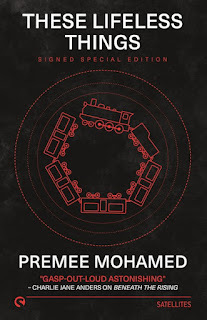 This review previously appeared in Interzone #290–291 (March-June 2021).
This review previously appeared in Interzone #290–291 (March-June 2021).These Lifeless Things is a novella published as part of the new Solaris Satellites series.
Fifty years ago, ninety-nine per cent of our species died during "the Setback". It lasted three years, and yet no one is sure what it was, even those who survived. Or at least no one believes what they have to say. Until a student on a field trip to an abandoned Ukrainian city discovers an old poetry book that might change everything: Eva, a woman who survived the initial disaster, kept a journal in its generous margins.
That brings the reader quickly to this book's one big flaw: while Eva's journal entries give us a fascinating insight into a world turned upside-down, of what it's like to be walled into a city with an implacable and unknowable enemy, they are presented entirely in italics, and they amount to sixty per cent of the book. It's a very odd decision, and one not made with accessibility in mind.That aside, it's a very good book, a successful combination of horror and science fiction that gives us trees with eyes and utterly incomprehensible alien intelligences. Readers might see echoes of Doctor Who villains like the Ogri or the Weeping Angels in its stony antagonists and their flickering movements, but the alien (or other-dimensional) encounters in this book are chilling in their own specific ways.
There are also moments of humour (Eva tells us that instead of resembling the cast of Mad Max, everyone looks like extras from Fiddler on the Roof), romance (a love likely to be unrequited held tight as a totem against the darkness) and betrayal (some humans are agents for the enemy, while others hunt for such agents and don't care too much if their accusations are unfounded).
In The Wailing Asteroid, Murray Leinster wrote that "if we ever have to face a superior race, we will die of it". Eva theorises that a shock like this is why ten million humans died in the first five minutes of the Setback, that even though "we bought the science fiction books … we simply did not imagine it". It was fascinating, albeit alarming, to read a book about our species hitting such a choke-point. Stephen Theaker ****
April 30, 2024
Theaker's Quarterly Fiction #76: now out!
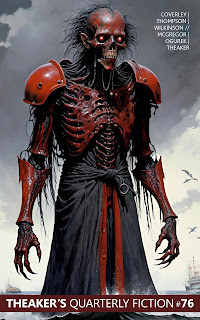 free epub | free pdf | print UK | print USA | Kindle (coming soon)Welcome to Theaker's Quarterly Fiction #76, edited by Stephen Theaker and John Greenwood!
free epub | free pdf | print UK | print USA | Kindle (coming soon)Welcome to Theaker's Quarterly Fiction #76, edited by Stephen Theaker and John Greenwood!Theaker’s Quarterly Fiction #76 features four short stories, a non-fiction article, and fifteen reviews. In “The White Body” by Harris Coverley, shipwrecked sailors encounter a dread being on the open seas. Scottish master of surrealism Douglas Thompson provides “The Apparatus of Yearning” and “Cupid and Psyche”. “Controlling the Lights from Above” by Charles Wilkinson is a tale concerning the long-term consequences of workplace bullying. In “Cultures of Climate Change, Changes of Climate Cultures”, Rafe McGregor considers fiction’s role in the face of ecological disaster. Then Stephen Theaker and Douglas Ogurek review books by Adam Cesare, Grady Hendrix, Kazuo Ishiguro, Rumaan Alam and C.J. Cooke, plus the films Aquaman and the Lost Kingdom, The Creator, Dream Scenario, Godzilla Minus One, No One Will Save You and Office Invasion, and the television shows Ahsoka, Doctor Who, Invasion and Monarch: Legacy of Monsters.
The cover art for this issue was generated using Wombo Dream.
Here are the contumacious contributors to this issue.
Charles Wilkinson’s publications include The Pain Tree and Other Stories (London Magazine Editions, 2000). His stories have appeared in Best Short Stories 1990 (Heinemann), Best English Short Stories 2 (W.W. Norton, USA), Best British Short Stories 2015 (Salt), Confingo, London Magazine and in genre magazines/ anthologies such as Black Static, Interzone, The Dark Lane Anthology, Supernatural Tales, Theaker’s Quarterly Fiction, Phantom Drift (USA), Bourbon Penn (USA), Shadows & Tall Trees (Canada), Nightscript (USA) and Best Weird Fiction 2015 (Undertow Books, Canada). His collections of strange tales and weird fiction, A Twist in the Eye (2016), Splendid in Ash (2018), Mills of Silence (2021) and The Harmony of the Stares (2022), appeared from Egaeus Press. Eibonvale Press published his chapbook of weird stories, The January Estate, in 2022. He lives in Wales. His work previously appeared in TQF41 (“Notes on the Bone”), TQF44 (“A Lesson from the Undergrowth”), TQF46 (“Petrol-Saved”), TQF48 (“A Thousand Eyes See All I Do”), TQF54 (“Septs”), TQF56 (“Mr Kitchell Says Thank You”), TQF59 (“The Constant Providers”), TQF60 (“Evening at the Aubergine Café”), TQF64 (“September Gathering”), TQF70 (“July Job Offer”) and TQF73 (“The Arrival of an Acquaintance”).
Douglas J. Ogurek is the pseudonymous and sophomoric founder of the unsplatterpunk subgenre, which uses splatterpunk conventions (transgressive/gory/gross/violent subject matter) to deliver a positive message. His short story collection I Will Change the World One Intestine at a Time (Plumfukt Press), a juvenile stew of horror and bizarro, aims to make readers lose their lunch while learning a lesson. Ogurek also guest-edits the wildly unpopular UNSPLATTERPUNK! “smearies”, published by Theaker’s Quarterly Fiction. These anthologies are unavailable at your library and despised by your mother. Ogurek reviews films and fiction for that same magazine.
Douglas Thompson has published more than twenty short story and poetry collections and novels from various publishers in the UK, Europe and the Americas, including The Brahan Seer from Acair Books (2014) and most recently Stray Pilot from Elsewhen Press (2022). He won the Herald/Grolsch Question Of Style Award in 1989, 2nd prize in the Neil Gunn Writing Competition 2007, and the Faith/Unbelief Poetry Prize in 2016. His work previously appeared in TQF28 (“Anatomy of a Wounded House”), TQF29 (“Madame Mortadore & the Clouds”), TQF37 (“Apoidroids”), TQF39 (“Escaladore”), TQF41 (“DogBot™”), TQF43 (“Quasar Rise”), TQF44 (“Black Sun”), TQF60 and TQF61 (“Yttrium”). See https://douglasthompson.wordpress.com/ for more details.
Harris Coverley has had more than a hundred short stories published in Penumbra, Crimeucopia, JOURN-E, and The Black Beacon Book of Horror (Black Beacon Books), amongst many others. A former Rhysling nominee, he has also had over two hundred poems published in journals around the world. He lives in Manchester, England. He previously appeared in TQF70 (“See How They Run! See How They Run!”); TQF72 (“Father Figure”); TQF73 (“The Scorpion”); TQF74 (“Kung Fu Sue: Origins”) and TQF75 (“Kleptobiblia”).
Rafe McGregor is a critical theorist publishing on culture, climate justice, and policing. He is the author of thirteen books, including Literary Theory and Criminology (2023), Narrative Justice (2018), and The Adventures of Roderick Langham (2017). He can be found online @rafemcgregor.
Stephen Theaker’s reviews, interviews and articles have appeared in Interzone, Black Static, Prism, Dark Horizons and the BFS Journal. His story “The Reader-Queens of Tranck” appeared in the BFS anthology Emerging Horizons, edited by Allen Ashley. He has written many novels, none of them well-regarded. The full range of his enthusiastic literary endeavours may be viewed on his ISFDB summary bibliography: https://isfdb.org/cgi-bin/ea.cgi?137563.
As ever, all back issues of Theaker's Quarterly Fiction are available for free download.
April 29, 2024
Boy Kills World | review by Stephen Theaker
 Tortured by the memory of his mother and sister’s public execution by their city’s totalitarian rulers during the annual Culling, a boy (known only as Boy) vows revenge. He trains hard in the jungle for years with the mysterious Shaman, who tests him physically, mentally and pharmacologically, and since his mentor is played by Yayan Ruhian, so spectacular in The Raid 2 and John Wick: Chapter 3, the kid picks up some amazing moves. Grown up and now played by It star Bill Skarsgård, he is on a rare trip into town for supplies when a new Culling begins. He can’t hold back, and the ultra-violent action begins.The trailer for Monkey Man made much of Jordan Peele’s involvement, even though my understanding is that he didn’t get involved until after the film had been made, and it had very little in common with his films. It makes much more sense for the Boy Kills World trailer to do the same with Sam Raimi’s name, because first-time director Moritz Mohr’s sensibilities will appeal to anyone who likes the Evil Dead films. The blood flows freely, the jokes are dark, and the villains are gleefully amoral. I was also reminded of Paul Verhoeven in his science fiction pomp (Robocop, Total Recall, Starship Troopers), albeit on a much lower budget.
Tortured by the memory of his mother and sister’s public execution by their city’s totalitarian rulers during the annual Culling, a boy (known only as Boy) vows revenge. He trains hard in the jungle for years with the mysterious Shaman, who tests him physically, mentally and pharmacologically, and since his mentor is played by Yayan Ruhian, so spectacular in The Raid 2 and John Wick: Chapter 3, the kid picks up some amazing moves. Grown up and now played by It star Bill Skarsgård, he is on a rare trip into town for supplies when a new Culling begins. He can’t hold back, and the ultra-violent action begins.The trailer for Monkey Man made much of Jordan Peele’s involvement, even though my understanding is that he didn’t get involved until after the film had been made, and it had very little in common with his films. It makes much more sense for the Boy Kills World trailer to do the same with Sam Raimi’s name, because first-time director Moritz Mohr’s sensibilities will appeal to anyone who likes the Evil Dead films. The blood flows freely, the jokes are dark, and the villains are gleefully amoral. I was also reminded of Paul Verhoeven in his science fiction pomp (Robocop, Total Recall, Starship Troopers), albeit on a much lower budget.The gimmick/USP is that Boy, having lost his speech and hearing when his family died, can’t remember his own voice, and so for his internal monologue he chooses a voice from a Streetfighter-style arcade fighting game. That voice becomes our narrator, the voiceover performed, hilariously, by H. Jon Benjamin of Archer fame (who also has a live-action cameo). We experience events as mediated via Boy’s consciousness, so if he doesn’t hear dialogue correctly, neither do we. Cutaways showing his attempts to visualise the misunderstood dialogue are imaginative and funny (and will reward rewatching with a pause button), although it sometimes feels a bit iffy that the main character he can’t understand is black, albeit with a big bushy beard.
It’s a film with an unusual tone – lying somewhere between the Far Cry or Saint’s Row games in their whackier moments – but it feels like everyone involved really gets it, even eleven-year-old Quinn Copeland, who is funny, tragic and adorable as the ghost of Boy’s little sister Mina, advising him in the midst of battle. I've mentioned the incredible Yayan Ruhian above, and the film gives him the perfect platform to demonstrate his physical abilities. Famke Janssen is perfect as the demented ruling matriarch, Hilda Van Der Koy, and Brett Gelman plays Gideon Van Der Koy, who looks like a Rasputinesque bear but just wants to be a writer, and is well aware of his role in this story. Sharlto Copley plays master of ceremonies again, as in Monkey Man, while Jessica Rothe is entertainingly vicious as June27, the ruling family’s assassin in a Daft Punk helmet.
As Basho, an ally Boy picks up along the way, Andrew Koji had me laughing out loud with every line of dialogue, particularly his promises to do “cart stuff” during fights (you had to be there) – and the cinema patron behind me laughed even louder each time, adding to the fun. And that’s what the film is, a huge amount of fun, if you like this kind of thing, full of twists, turns and imaginative, cartoonish violence. Again like Monkey Man, I might have preferred a clearer view of the action at times, but unlike that film, Boy Kills World keeps the action going and the tempo high throughout, and I doubt anyone would accuse it of not living up to its trailer. Stephen Theaker ****



